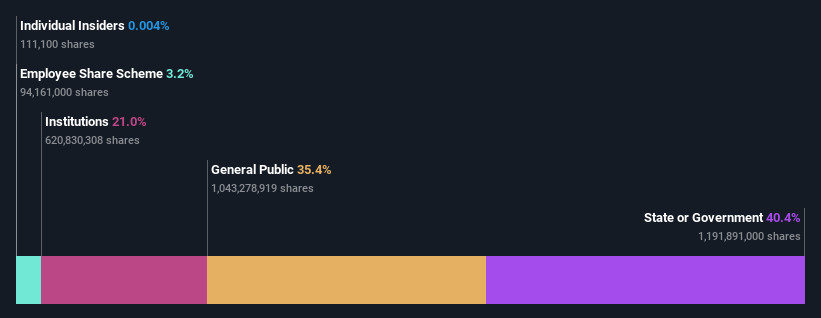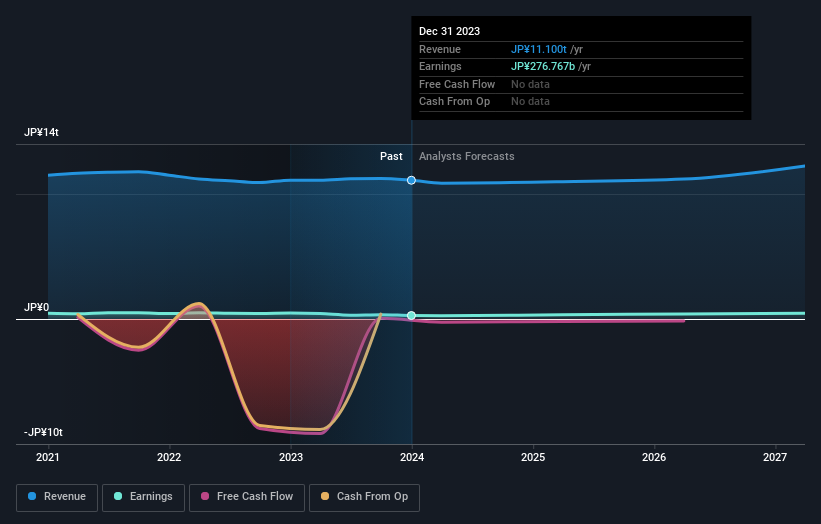Stock Analysis
State or government among Japan Post Holdings Co., Ltd.'s (TSE:6178) largest shareholders, saw gain in holdings value after stock jumped 4.8% last week

Key Insights
- The considerable ownership by state or government in Japan Post Holdings indicates that they collectively have a greater say in management and business strategy
- A total of 5 investors have a majority stake in the company with 50% ownership
- Institutions own 21% of Japan Post Holdings
A look at the shareholders of Japan Post Holdings Co., Ltd. (TSE:6178) can tell us which group is most powerful. We can see that state or government own the lion's share in the company with 40% ownership. That is, the group stands to benefit the most if the stock rises (or lose the most if there is a downturn).
As a result, state or government were the biggest beneficiaries of last week’s 4.8% gain.
Let's delve deeper into each type of owner of Japan Post Holdings, beginning with the chart below.
See our latest analysis for Japan Post Holdings

What Does The Institutional Ownership Tell Us About Japan Post Holdings?
Institutions typically measure themselves against a benchmark when reporting to their own investors, so they often become more enthusiastic about a stock once it's included in a major index. We would expect most companies to have some institutions on the register, especially if they are growing.
Japan Post Holdings already has institutions on the share registry. Indeed, they own a respectable stake in the company. This can indicate that the company has a certain degree of credibility in the investment community. However, it is best to be wary of relying on the supposed validation that comes with institutional investors. They too, get it wrong sometimes. If multiple institutions change their view on a stock at the same time, you could see the share price drop fast. It's therefore worth looking at Japan Post Holdings' earnings history below. Of course, the future is what really matters.

We note that hedge funds don't have a meaningful investment in Japan Post Holdings. The company's largest shareholder is Ministry of Finance Japan, with ownership of 39%. With 3.2% and 3.0% of the shares outstanding respectively, Japan Post Holdings, Employees' Shareholding Association and Nomura Asset Management Co., Ltd. are the second and third largest shareholders.
On looking further, we found that 50% of the shares are owned by the top 5 shareholders. In other words, these shareholders have a meaningful say in the decisions of the company.
While studying institutional ownership for a company can add value to your research, it is also a good practice to research analyst recommendations to get a deeper understand of a stock's expected performance. There are a reasonable number of analysts covering the stock, so it might be useful to find out their aggregate view on the future.
Insider Ownership Of Japan Post Holdings
While the precise definition of an insider can be subjective, almost everyone considers board members to be insiders. Company management run the business, but the CEO will answer to the board, even if he or she is a member of it.
Insider ownership is positive when it signals leadership are thinking like the true owners of the company. However, high insider ownership can also give immense power to a small group within the company. This can be negative in some circumstances.
Our data suggests that insiders own under 1% of Japan Post Holdings Co., Ltd. in their own names. Being so large, we would not expect insiders to own a large proportion of the stock. Collectively, they own JP¥165m of stock. In this sort of situation, it can be more interesting to see if those insiders have been buying or selling.
General Public Ownership
The general public, who are usually individual investors, hold a 35% stake in Japan Post Holdings. While this group can't necessarily call the shots, it can certainly have a real influence on how the company is run.
Next Steps:
While it is well worth considering the different groups that own a company, there are other factors that are even more important. Consider for instance, the ever-present spectre of investment risk. We've identified 2 warning signs with Japan Post Holdings (at least 1 which is concerning) , and understanding them should be part of your investment process.
But ultimately it is the future, not the past, that will determine how well the owners of this business will do. Therefore we think it advisable to take a look at this free report showing whether analysts are predicting a brighter future.
NB: Figures in this article are calculated using data from the last twelve months, which refer to the 12-month period ending on the last date of the month the financial statement is dated. This may not be consistent with full year annual report figures.
Valuation is complex, but we're helping make it simple.
Find out whether Japan Post Holdings is potentially over or undervalued by checking out our comprehensive analysis, which includes fair value estimates, risks and warnings, dividends, insider transactions and financial health.
View the Free AnalysisHave feedback on this article? Concerned about the content? Get in touch with us directly. Alternatively, email editorial-team (at) simplywallst.com.
This article by Simply Wall St is general in nature. We provide commentary based on historical data and analyst forecasts only using an unbiased methodology and our articles are not intended to be financial advice. It does not constitute a recommendation to buy or sell any stock, and does not take account of your objectives, or your financial situation. We aim to bring you long-term focused analysis driven by fundamental data. Note that our analysis may not factor in the latest price-sensitive company announcements or qualitative material. Simply Wall St has no position in any stocks mentioned.
About TSE:6178
Japan Post Holdings
Japan Post Holdings Co., Ltd. provides postal, banking, and insurance services in Japan.
Good value with limited growth.

